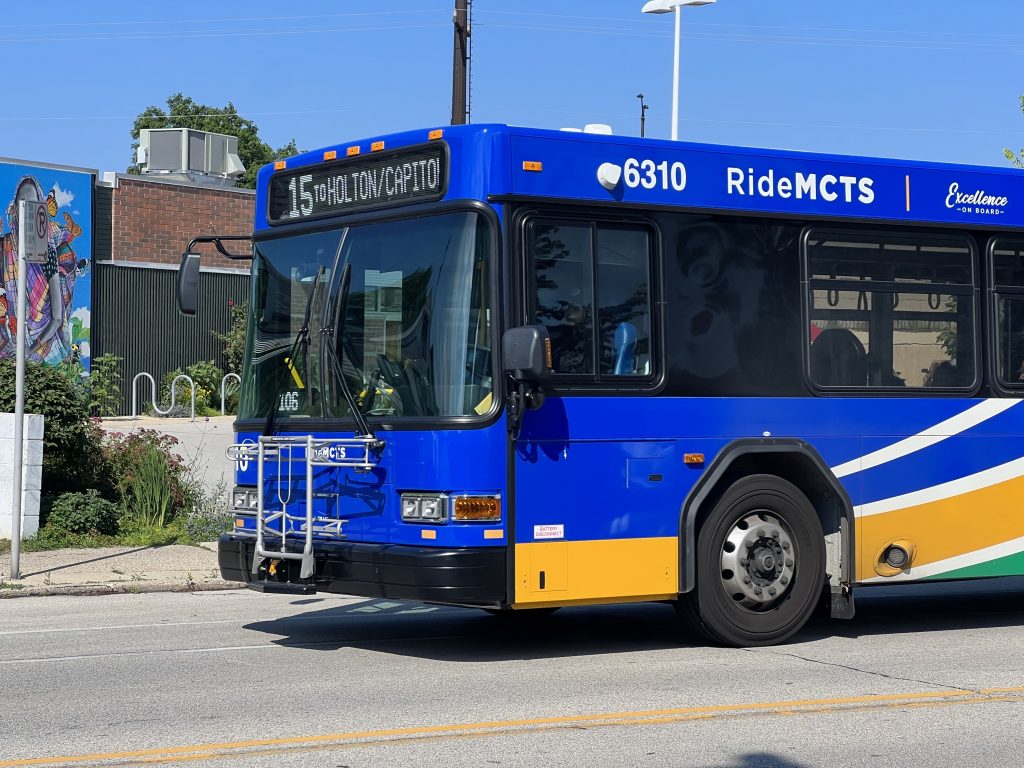How Should MCTS Spend $35,000?
Bus drivers union at odds with transit system over safety.

MCTS bus. Photo by Jeramey Jannene.
The Milwaukee County Board of Supervisors has spent a considerable amount of time deliberating over the proper use of just $35,000.
The funding comes from the 2025 budget. And the reason deliberations are ongoing is because the budgeted use for the funds is no longer being pursued: Uber rides for bus drivers.
The funding was put in the budget for the Milwaukee County Transit System (MCTS) to pursue using transportation network companies (TNCs) like Uber and Lyft to ferry bus operators from mid-route relief points back to their originating station.
MCTS buses run their routes non-stop. So operators often finish their shift mid-route and find themselves at what the system calls a “relief point.”
Historically, operators have had to catch a nearby bus to the station. Their union, Amalgamated Transit Union Local 998 (ATU 998), has called for quicker, more direct rides for the operators for two reasons. First, operators have been assaulted at relief points, so it is a perceived safety issue. Second, operators are not paid for the time it takes them to get back to the station, so the union wants to expedite this travel time.
In 2024, MCTS began providing a relief pickup program with vans. That effort was created internally by MCTS and the funding for it is scheduled to run out in June.
In April, MCTS reported that the Uber program would be too expensive. So what to do next?
MCTS wants to move the funding over to its in-house security called Public Safety Officers (PSO). But the union really likes the van program and wants the money put there instead.
ATU representatives have repeated at several meetings that not only does the van program work, but, by their estimation, it is exceeding expectations in terms of the number of bus operators that can be picked up with just two vans.
“Our operators want and deserve this van program,” said Tom Stawicki, legislative services director for ATU 998. “The company started the pilot program, and it was well received.”
During a meeting of the board’s Transportation and Transit Committee Tuesday, MCTS COO Kevin Pumphrey said the system thought it could get more bang for its buck by using the $35,000 on its private security force — which the union long advocated.
If the funding is used on the van program, it will last two months. Whereas the funding could be extended out the rest of the year if it was plugged into the security program, according to Pumphrey. ATU 998 representatives have also disagreed with MCTS’s characterization of the program.
Pumphrey also said the two vans are only able to serve a small fraction of all the relief points in the system. However, advocates in the union and on the board are less concerned with expanding the program to every relief point than with simply keeping it going.
“I believe we can sit down between ATU and MCTS and work out something,” said former ATU president Donnell Shorter. “This isn’t something that we want to have a relief point for every route, every operator; we just want to try and serve the majority, especially the [Purple Line operators].”
Some of the relief points along the Purple Line can leave operators waiting for 20 to 25 minutes for another bus to pick them up, Shorter explained. On weekends, when service is slower, some bus operators can wait 45 minutes for a bus, said ATU Vice President Michael Brown.
“We need to take a look at the fact that we’re really talking about money versus the safety of these people that are instrumental in making the system work,” said Bruce Freeman, current ATU President.
The extension, or future, of the van program was supposed to be part of collective bargaining between MCTS and the union, said Interim MCTS Managing Director Julie Esch. Bargaining for the next contract is currently underway.
Sup. Shawn Rolland sponsored an amendment to do just that, but the board’s Committee on Transportation and Transit unanimously rejected it.
Rolland said that, based on MCTS data, there were more assaults on the bus than at relief points in 2024. He sponsored the amendment because, from a security perspective, it made sense to put additional resources into officers that can be on the bus, he said.
Other supervisors, however, were frustrated that MCTS wasn’t simply rolling the funding over into the van program.
Sup. Justin Bielinski noted that he “put some political capital on the line” when he took funding out of the Milwaukee County Sheriff‘s Office (MCSO) budget to purchase additional vans for the relief program in the 2025 budget, adding that he wasn’t going to just let the van program go away.
“Obviously, security is important, but so is getting people back to the relief point in a timely manner,” he said. “And since we know that these drivers are not getting paid to get back to their relief point, it seems like the quicker we can get more drivers back to the relief point, the less sort of wage theft we’re perpetrating upon them… but to just unilaterally end it because we can’t afford to get every driver doesn’t seem to make a lot of sense.”
The board approved the funding specifically for picking up drivers at relief points, said Sup. Jack Eckblad. He also questioned why MCTS did not roll the funding over into the van program.
“The intention was for this money and the vans to be used to make the case for a successful program,” he said.
MCTS’s goal remains to increase safety by spending the funding on security, Esch told Urban Milwaukee in a statement.
“The van relief pilot has been a limited, short-term solution,” Esch said. “Instead, we believe the best use of future funding on safety and security is the long-term solution that our Public Safety Officers can provide.”
The amendment rejected by the transit committee has been resubmitted for a vote before the full county board later this month, pending its introduction on the floor.
Legislation Link - Urban Milwaukee members see direct links to legislation mentioned in this article. Join today
If you think stories like this are important, become a member of Urban Milwaukee and help support real, independent journalism. Plus you get some cool added benefits.
Transportation
-
Congestion Pricing Cuts Air Pollution in New York City
 Dec 14th, 2025 by Jeff Wood
Dec 14th, 2025 by Jeff Wood
-
FTA Tells Milwaukee to Crack Down on Fare Evasion — Even Where Fares Don’t Exist
 Dec 12th, 2025 by Graham Kilmer
Dec 12th, 2025 by Graham Kilmer
-
Will GOGO’s Bus Service Ever Get Going?
 Dec 9th, 2025 by Jeramey Jannene
Dec 9th, 2025 by Jeramey Jannene




















